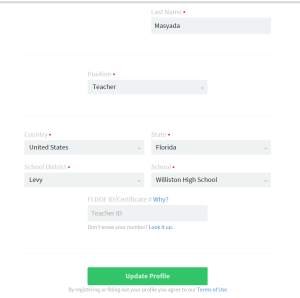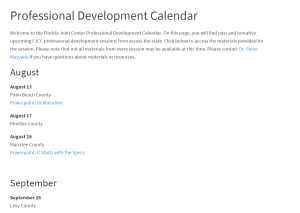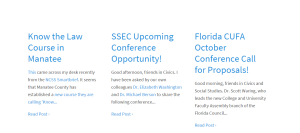- Nathan Smith: “American egalitarianism is a sheltered creed that needs the border as blindfold to retain its limited plausibility as an ideal.”
- Literary Magazines for Socialists funded by the CIA, ranked (Partisan Review is #3)
- Pope Francis to visit a Pennsylania prison and call for reform in Congress.
- Michael Rosen: I sometimes fear that people might think that fascism arrives in fancy dress worn by grotesques and monsters as played out in endless re-runs of the Nazis. Fascism arrives as your friend. It will restore your honour, make you feel proud, protect your house, give you a job, clean up the neighbourhood, remind you of how great you once were, clear out the venal and the corrupt, remove anything you feel is unlike you…It doesn’t walk in saying, “Our programme means militias, mass imprisonments, transportations, war and persecution.”
- W. H. Auden: “There were two kinds of machinery for separating the slime, one I thought more beautiful than the other, but the other one I knew to be more efficient. I felt myself faced with what I can only call a moral choice—it was my duty to take the second and more efficient one. Later, I realized, in constructing this world which was only inhabited by me, I was already beginning to learn how poetry is written.”
- Tax preparers lobby for more complicated taxes.
Monthly Archives: August 2015
although Millennials are most numerous, youth share is shrinking
Richard Fry of the Pew Research Center reports, “This year, the ‘Millennial’ generation is projected to surpass the outsized Baby Boom generation as the nation’s largest living generation, according to the population projections released by the U.S. Census Bureau last month.” His article is illustrated with this graph:

That analysis tells one important story. It suggests that the youngest generation will have growing political, economic, and cultural clout, which is true in some respects.
But there is also another valid story: even as the Millennials outnumber each of the older generations taken separately, younger people are declining as a percentage of the whole population. That analysis suggests that their political clout (dependent on their share of voters and activists) will likely shrink.
How can this be? On one hand, the youngest generation is larger than its predecessors because of population growth, while the older generations are shrinking because of mortality. (The downward slope of the Boomers in the Pew chart above is a momento mori.) Yet, on the other hand, each of the older age categories is larger today than the same category was in the past. The median age, after all, is rising. Since there are many age categories, not just two, it’s possible for the youngest generation to grow relative to every other generation while also shrinking relative to the whole. And that is what has happened over the past 50 years, as my graph shows:
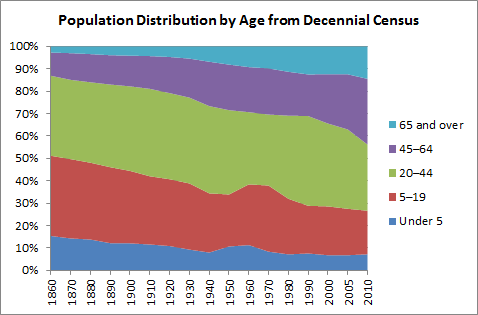
If we are champions of youth civic engagement, I think we can take some advantage of the large numbers of Millennials, but we must also address the fact that youth represent a smaller proportion of the whole population than ever before.
on Hillary Clinton and Julius Jones of #blacklivesmatter
The taped discussion between Hillary Clinton and Julius Jones of Black Lives Matter is a rich and fascinating document (full transcript here). Jones begins by telling HRC, “You and your family have been personally and politically responsible for policies that have caused … disasters in impoverished communities of color. … And so I just want to know how you feel about your role in that violence and how you plan to reverse it?”
HRC acknowledges the very bad consequences of the War on Drugs and mass incarceration. But the two disagree about whether those policies were “extensions of white supremacist violence” (Jones) or else well-intentioned responses to the “very serious crime wave that was impacting primarily communities of color and poor people” and to the “very real concerns of people in the communities themselves” (HRC).
(NB It is possible that both interpretations are true, or at least partly so. For an interesting contemporaneous document on Black politicians and the 1994 Crime Bill, see this clipping, courtesy of the Brennan Center.)
Clinton repeatedly asks Jones for policy proposals, and Jones repeatedly presses Clinton for more explicit expressions of regret or changes of heart. The dialog ends with this exchange:
JONES: The piece that’s most important, and I stand here in your space, and I say this as respectfully as I can, but you don’t tell Black people what we need to do. And we won’t tell you all what you need to do.
HILLARY CLINTON: I’m not telling you—I’m just telling you to tell me.
[snip]
HILLARY CLINTON: Well, respectfully, if that is your position then I will talk only to White people about how we are going to deal with the very real problems—
QUESTION: That’s not what I mean. That’s not what I mean. But like what I’m saying is what you just said was a form of victim-blaming. Right you were saying that what the Black Lives Matter movement needs to do to change white hearts—
HILLARY CLINTON: Look I don’t believe you change hearts. I believe you change laws, you change allocation of resources, you change the way systems operate. …
One difference here is about mechanisms of change. Clinton acknowledges that there is value to the “the consciousness-raising, the advocacy, the passion, … of your movement,” but she believes that change always requires the passage of laws that reallocate rights and powers. Jones thinks that what Clinton believes and says to other White people about their own responsibility is a crucial element of change.
Another (related) difference is about the diagnosis of social problems. Clinton sees a set of interlocking causes for mass incarceration, including well-intentioned laws, economic factors, racism, etc. “You know, it’s not just an economic issue—although I grant that some of you will see it like that. But it’s more than that and I think there is a sense that, low level offenders, disparity treatment, we’ve got to do something about that. I think that a lot of the issues about housing and about job opportunities—’Ban The Box’—a lot of these things, let’s get an agenda that addresses as much of the problem as we can.”
In partial contrast, Jones sees one root cause to the problem, and it involves the hearts of white people (which Clinton has said you can’t change). Jones says, “Until someone takes that message and speaks that truth to White people in this country so that we can actually take on anti-Blackness as a founding problem in this country, I don’t believe that there is going to be a solution.”
My thoughts, for what they’re worth:
First, if it is ever helpful to ask any candidate about her values and priorities, then it is appropriate to probe Hillary Clinton’s “heart” on questions about race. I tend to think that we rely too much on psychological evaluations of candidates. Our impressions are almost always inaccurate, because our relationships with politicians are mediated; and they have less scope for choice than we assume. But this is a huge issue on which President Hillary Clinton might have quite a bit of scope for choice. She also has a problematic record. It is helpful to know what she deeply thinks now. That is information a citizen can use in deciding how and whether to vote.
But I have doubts about a general strategy of trying to get people to acknowledge their privileges. (This is more about the White voters to whom HRC would talk about white supremacy than about her own opinions.) “Privilege” means an unjustifiable advantage. Telling people they have a privilege may easily remind them of an advantage that they will want to protect. Cases are rare indeed when large numbers of people have acknowledged privileges and then dropped them. One example was August 4, 1789, when representatives of the French aristocracy stayed up all night voting to repeal the various privileges of the nobility. It was a glorious night but it did not end well.
The last paragraph may seem cynical, but I am optimistic about other paths to change that do not involve getting privileged people to acknowledge their privileges. The oppressed can gain leverage (economic or political) and negotiate change. Or a majority can be persuaded that change is in their interests as well. For instance, middle class white people may be persuaded that mass incarceration is unnecessarily expensive. In the transcript, HRC says, “That’s what I’m trying to put together in a way that I can explain and I can sell it. Because in politics, if you can’t explain it and you can’t sell it, it stays on its shelf.” I don’t know if she has in mind arguments about cost, but they would exemplify arguments that she could “sell.”
I am generally committed to a critique of root-cause analysis. (See Roberto Unger against root causes and this post on the idea of root causes in education.) I believe that problems typically involve multiple causes and complex feedback loops; and sometimes you can make the most substantial and lasting difference by attacking an apparently superficial element of a system. That said, the Black Lives Matter campaign is making a strong argument that racism, if not the one root cause of a wide range of problems, is at least necessarily involved in any solution.
Finally, I do not agree with Clinton that you can’t–or shouldn’t–“change hearts.” In the 2008 primaries, she and Senator Obama had an important debate about the role of bottom-up social movements in reforming society by changing values and perceptions. Clinton tended to disparage their impact, arguing, for instance, that the main impact of the Civil Rights Movement came from politicians’ passing the Civil Rights Acts. I think Obama was right to emphasize the deep changes in values and everyday behavior that arose from the social movement. (See Wilentz v. Ganz on the Obama social movement and the Clinton/Obama spat.)
However, a national political leader is well placed to pass laws but poorly placed to lead a social movement, as I think we have observed during President Obama’s period in the White House. So it could be that HRC is correct about the role she should be playing, even if she is wrong to downplay social movements that change hearts.
(Cf. #Blacklivesmatter and Sen. Sanders: social democracy and identity politics.)
Elementary ‘Civics in a Snap’ Lessons!
As we celebrate the relaunch of the Florida Joint Center for Citizenship website (seriously; we had balloons), I want to make sure that you are aware of brand new civics lessons that we have posted on the site. These lessons, which we are calling ‘Civics in a Snap’, are 15-20 minutes long and are aligned with both the Florida Standards (what used to be Common Core) and with the elementary civics benchmarks. You can check out the lessons here, once you have registered. While they are designed for Florida, we welcome those from other states to adapt them as you like to fit your standards!

Civics in a Snap! For when you have just enough time to help your kids learn about being good citizens!
I also want to thank the folks in Miami-Dade for the work that they did on the lessons. The whole process was wonderful, and the fact that these are 100% teacher created is simply exciting.
We owe a great deal of gratitude to Miami-Dade Social Studies Supervisor Robert Brazofsky and the following teachers:
Susan Boundy
Elizabeth Chang Warren
Ashley Clinch
Nora Espinosa
Marie Garcia
Angelica Hernandez
Bienicka Jean-Mary
Olga Marrero
Dr. Mercy MacDowell
Estrella Mellon
Susan Rodriguez
Christina Romero
Virginia Sanchez
Sharon Shelley
Cassie Slone (Pinellas County)
Nicolas Valdes
Florida Joint Center for Citizenship Website Relaunch!
Friends in Civics here and Florida and across the country, I just want to take a moment and let you know that the Florida Joint Center for Citizenship has just relaunched its website! We have attempted to make it easier to navigate, more user friendly, and more flexible on the back end in adding features and tools. So what are the most important new features?
Registration Changes
One of the first things that you will notice when you arrive at the site and attempt to access the resources is that you will be required to log in and create/update your profile (if you have logged in in the past) or to create a new log in/registration (if this is a first visit or you want to use a different email). You will notice a couple of additions to the profile page. The most important addition is the request for your FLDOE number.
Now, the FLDOE number IS optional, so why are we asking for it? Well, it has become incumbent upon us to be able to illustrate whether or not the Florida Joint Center for Citizenship is having an impact on student achievement across the state. To do so, we need to be able to connect EOC scores stored by the Education Data Warehouse to our work. By providing your FLDOE number, this makes that data effort so much easier. Your data will NEVER be shared with anyone. We thank you for your help on this.
Once you have completed your profile, you will be able to access all of the resources you need! And for those that have used our site in the past, the system shouldn’t constantly log you out every time you change pages. If you DO wish to log out (but why?), simply click on your name and then press the log out button on the profile page. If you have problems registering on the site, please send me an email!
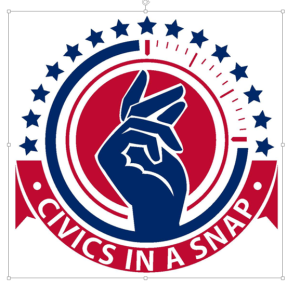
Civics in a Snap! For when you have just enough time to help your kids learn about being good citizens!
The Civics in a Snap lessons are aimed at K-5 classrooms, and provide 15-20 minute lessons centered around the elementary civics benchmarks. For more, take a look at this overview I shared earlier. You can actually preview the lesson before downloading it, which is something that we also hope to do with the 7th grade curriculum soon!
Professional Development Calendar
The FJCC Professional Development Calendar is where you can follow along on our adventures across the state as we work with teachers, schools, and districts to create the best citizens we can for the state. We will also be providing the resources that we used at the specific PD session on this page, though that may not always be available. Finally, we will be putting up a downloadable ‘PD request’ form that will make it easier to plan who wants what where! :)
In the future (once we work out the kinks, as with the dates and the layout), the blog will be transitioning to the main website, and you will be able to see the most recent posts right there on the front page of the site! For now, we will continue to post in both places.
Future Developments
As I mentioned, we do have plans to continue revising and improving the website. We are looking at adding some sort of discussion forum, improved feedback options, 7th grade lesson plan previews, greater digital interactivity options, and more. We are open to ideas and suggestions as well! And a big THANK YOU to our own Mike Barnhardt, for his work on the site!!!!
Join Journalist & Community Gathering for Civic Impact
We hope our members will consider attending the Experience Engagement gathering this October 1-4 in Portland. This unique gathering is being supported by NCDD Board member Marla Crockett and NCDD Sustaining Member Peggy Holman, and we encourage you to learn more in the announcement that Peggy recently shared with us below. Take advantage of their freelancer and student rates by registering here!
Experience Engagement
Experience Engagement, How Journalism and Communities Can Thrive Together takes place October 1-4 at the University of Oregon’s facility in Portland, Oregon.
This meeting is unique in both format and intention.
- Unique in format because it brings together a diversity of people for a peer-based learning exchange, including journalists, community activists, students, educators, researchers, funders, artists, social entrepreneurs, librarians, technologists and urban planners.
- Unique in intention because we see it as a working session to not only meet personal and organizational needs but to advance the field by producing an interactive field guide – a site that articulates the best of what we learn from each other, for example, principles and practices for engagement and evaluating its impact.
We are looking for a mix that would include about 40% journalists, 40% community connectors and story tellers, and 20% students, academics, and people from organizations that support journalists and community connectors.
Please bring your brilliance to the conversation on community engagement and civic life. Together, we can make visible the best of what is and imagine a great future for news and information that supports communities to thrive.
Space is limited to 125 people so register soon.
To learn more or to register, please visit www.
A New Civics-Related Course in Manatee County
This came across my desk recently from the NCSS Smartbrief. It seems that Manatee County has established a new course they are calling ‘Know the Law’. This course will be for 7th grade (and some 9th grade) students, and as such, it will overlap with the Civics course that most students in 7th grade take in Florida. The course is intended to The “teach students to understand their rights when it comes to the law and the consequences for violating it.”
Mainly, the class focuses on the consequences students will face if they break the law. Offenses include doing drugs, committing a violent offense or throwing house parties with alcohol.
“It’s going to focus on how it will affect them and their future if they do drugs or commit other crimes,” Bristow said. “Because a lot of them don’t think of the consequences to their futures.”
The lesson has a large section on future consequences, which details how having a criminal record can affect a student’s chances to participate in the military, attend certain colleges and work in certain jobs.
The lesson also explains when a juvenile can be charged as an adult for certain crimes, the differences between misdemeanors and felonies and what constitutes sexual battery/rape.
I’ve been looking around for the course curriculum and haven’t found it yet. I would love to see just how it approaches some of these issues, and how in depth it gets into helping students understand their rights as well as their responsibilities. Is it just primarily focused on consequences? Or does it actually get into things like civil liberties and rights?
I also find it interesting that this course will be taught through the civics course. Without a doubt, the civics course could lend itself well to this sort of thing, as long as it is integrated smoothly. But that is the question, isn’t it? The civics course itself, you will recall, has an EOC attached to it, so when and how will teachers include THIS curriculum without impeding instruction in the general civics course? If anyone knows any more about this, we would love to hear from you!
You can read the whole article that discusses this course at the Bradenton Herald.
“Try Charter Schools Experiment Where Others Failing” (2010)
Now that my new site is up, I’m slowly but surely adding to it the pieces I had up on my old site. This was my first op-ed published in The Clarion Ledger, published March 6, 2010, on 9A. I am grateful for permission to republish my pieces here and elsewhere.
Here’s a scan of the piece, though the character recognition in the file didn’t work well. Therefore, I’m posting here the text from the piece.
Try Charter Schools Experiment Where Others Failing
In January, three University of Mississippi undergraduates advocated for charter schools before the Mississippi House Committee on Education out of concern for the crisis of education in the state. The Public Policy Leadership majors, Chelsea Caveny, Cortez Moss, and Alex McLelland, met resistance to partial measures for progress.
Aside from a few vocal opponents, the general response from Republicans in the room was positive and some Democrats were cautiously open to charter schools. The most vocal opponents of charter school legislation worried about the children who stay behind in traditional schools. One representative exclaimed: “Separate but unequal!”
 I can understand the resistance. If charter schools only help some, are they not institutions that tell others to wait? Dr. Martin Luther King Jr. had to explain time and time again “why we can’t wait.” He was a great opponent of the numbing gradualism of his day. Being patient is not something suffering people can easily stomach. Despite this powerful motivation, however, the objection to gradualism is misapplied when it comes to charter schools. Charter schools represent the potential, certainly not a guarantee, for substantial progress in education in the state.
I can understand the resistance. If charter schools only help some, are they not institutions that tell others to wait? Dr. Martin Luther King Jr. had to explain time and time again “why we can’t wait.” He was a great opponent of the numbing gradualism of his day. Being patient is not something suffering people can easily stomach. Despite this powerful motivation, however, the objection to gradualism is misapplied when it comes to charter schools. Charter schools represent the potential, certainly not a guarantee, for substantial progress in education in the state.
At the committee meeting in January, three worries arose. First, if charter schools are the answer, why not overhaul the whole system to follow their method? In response to this concern, the issue is not a desire for progress to be slow. Rather, what is needed is sincere experimentation. In different states and regions, different methods work well or poorly. Charter schools need fine-tuning. Good experimenters, furthermore, don’t stop after one try. Once a model is successful in our state, we should replicate it then and then only, as the urban prep schools did in Chicago.
 The second worry that our legislators raised was that charter schools may not work as well in rural areas. There are clear exceptions to this concern, however, such as the KIPP schools (Knowledge Is Power Programs) which have locations in Helena-West Helena, Ark. What seemed to be lacking in the legislators’ responses to the students’ presentation was the will to try, to experiment with new ideas. Innovation and change require openness of mind to the possibilities that others may not have attempted.
The second worry that our legislators raised was that charter schools may not work as well in rural areas. There are clear exceptions to this concern, however, such as the KIPP schools (Knowledge Is Power Programs) which have locations in Helena-West Helena, Ark. What seemed to be lacking in the legislators’ responses to the students’ presentation was the will to try, to experiment with new ideas. Innovation and change require openness of mind to the possibilities that others may not have attempted.
A final concern came up. In the accusing charge of “separate but unequal!” was the reasonable worry people have about achievement gaps between white and minority students. This week, the House version of the charter school legislation made sure to emphasize that charters could be established only in replacing schools with a three-year track record of failure. This requirement would ensure that charters be created only where schools most need help, not simply as alternatives for already advantaged students.
Charter school legislation is moving forward for consideration. What is crucial for the future of Mississippi, I believe, is that we regain the will to experiment and to try new ideas. Charter school legislation may only be a partial measure, a step in a larger plan.
With good legislation written to allay the worries people have about charters, however, the charter school initiative could represent a great step forward and in the right direction.
 Dr. Eric Thomas Weber is assistant professor [now associate professor, since 2013] of Public Policy Leadership at the University of Mississippi, expressing only his own point of view in this guest column. His second book, Morality, Leadership and Public Policy, will be released in 2011 [and is now out in hardback and paperback].
Dr. Eric Thomas Weber is assistant professor [now associate professor, since 2013] of Public Policy Leadership at the University of Mississippi, expressing only his own point of view in this guest column. His second book, Morality, Leadership and Public Policy, will be released in 2011 [and is now out in hardback and paperback].
debating the continued importance of institutions
Back in June, at the Boston Civic Media conference, I was part of a panel with Ethan Zuckerman, Director of the MIT Center for Civic Media, Christine Gaspar, director of the Center for Urban Pedagogy, and Doris Sommer, professor and Director of the Cultural Agents Initiative at Harvard University. Among other topics, we debated the continued importance of institutions in a world increasingly characterized by loose networks. I took an institutionalist (maybe even an unrepentantly paleo-institutionalist) line. Boston Civic Media has put up a brief and cogent summary of the panel as well as the full audio, which is below. See also “why I still believe in institutions,” which I posted immediately after.
Teaching Civics in the Sunshine State
Another link for you as we head into the new school year. Recently, Dr. Elizabeth Washington (director of the social studies Proteach program at UF and Senior Fellow here at the Florida Joint Center for Citizenship) and I had the chance to sit down with Dr. Emma Humphries of iCivics and the Bob Graham Center to discuss teaching civics in the Sunshine State. For me, two big things to remember: civics is NOT history and should not be taught as such, and always always always use the Civics Benchmarks Item Specifications in your planning, teaching, and assessment! Also, I need to lose weight.
I enjoyed the opportunity to sit down with Emma and Elizabeth and just talk civics, and I hope that you find some of what you see and hear in the video useful. Feel free to address any questions or comments my way!


